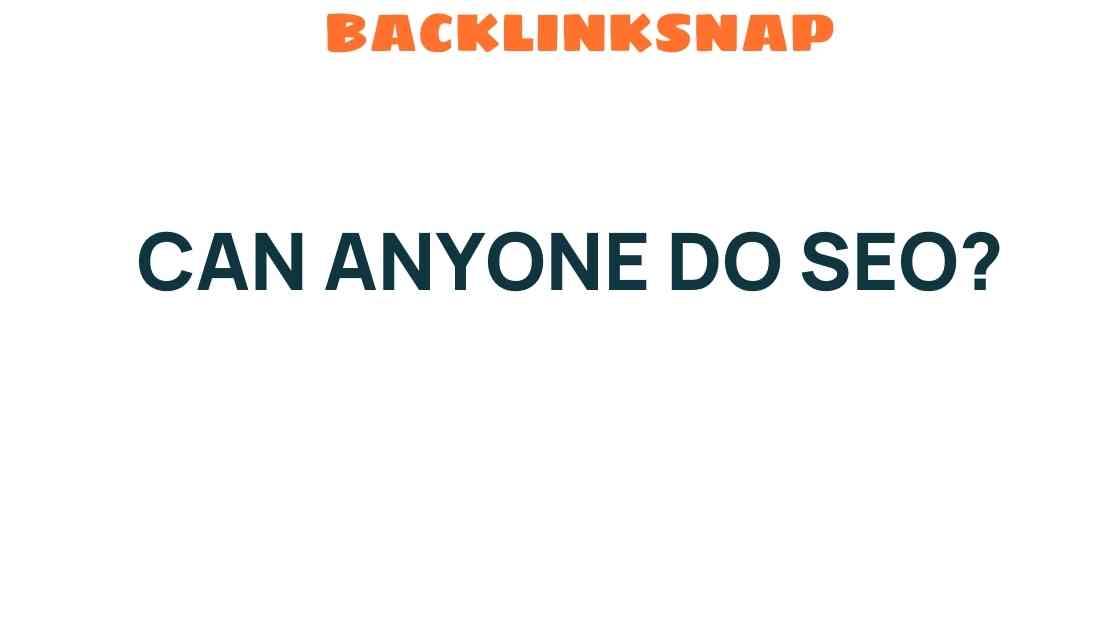Can Anyone Do SEO? Unraveling the Myths and Realities of Search Optimization
When it comes to SEO, or search engine optimization, the question on many people’s minds is: can anyone do it? The short answer is yes, but the journey is more nuanced. With the right tools, knowledge, and a bit of practice, anyone can improve their website’s visibility and drive more traffic. However, let’s delve deeper into the myths and realities surrounding SEO and explore what it truly takes to succeed in this vital aspect of digital marketing.
The Essentials of SEO
At its core, SEO is about making your website more visible on search engines like Google. The ultimate goal is to attract more visitors, which can lead to higher conversion rates, whether that means more sales, sign-ups, or engagement.
To achieve this, SEO encompasses several strategies, including:
- Keyword Research: Identifying the terms and phrases your target audience uses.
- Content Strategy: Creating valuable content that addresses the needs and interests of your audience.
- On-Page Optimization: Adjusting elements on your website, such as meta tags, headings, and images.
- Off-Page Optimization: Building backlinks and improving your site’s authority through external sources.
- Technical SEO: Ensuring your website runs smoothly and is accessible to search engines.
Each of these areas requires a different skill set and understanding, but they all contribute to the overarching goal of enhancing online visibility.
Common Myths About SEO
One of the significant hurdles for newcomers to SEO is the myriad of myths that cloud the understanding of what it entails. Here are some of the most common misconceptions:
- SEO is a One-Time Task: Many believe that once they optimize their site, they can sit back and relax. In reality, algorithm updates and changing market conditions mean that continuous effort is necessary.
- SEO Guarantees First Page Rankings: No one can guarantee a specific ranking, as search engines use complex algorithms that consider numerous factors.
- SEO is Only for Big Companies: Small businesses can benefit immensely from effective SEO strategies, often competing successfully against larger brands.
- Content Isn’t Important: High-quality content is central to any successful SEO strategy. It not only attracts visitors but also encourages backlinks.
The Realities of SEO
Understanding the realities of search engine optimization can empower individuals to approach it with the right mindset. Here’s what you need to know:
- It Requires Learning: While basic SEO concepts can be grasped quickly, mastering it takes time and ongoing education.
- Tools Are Essential: Utilizing SEO tools can streamline tasks such as keyword research, performance tracking, and competition analysis. Popular tools include Google Analytics, SEMrush, and Ahrefs.
- Patience is Key: Results from SEO efforts can take time to materialize. It’s important to stay committed to your strategy.
- Adaptability is Crucial: With frequent algorithm updates from search engines, being flexible and adapting your strategies is necessary for long-term success.
How to Get Started with SEO
If you’re eager to dive into SEO, here’s a roadmap to help you begin:
- Learn the Basics: Start with free resources, such as Google’s SEO Starter Guide or trusted blogs like Moz and Search Engine Journal.
- Conduct Keyword Research: Use tools like Google Keyword Planner to identify relevant keywords that your target audience is searching for.
- Develop a Content Strategy: Focus on creating high-quality, valuable content that addresses the questions and needs of your audience.
- Optimize Your Website: Ensure that your website is user-friendly, mobile-optimized, and fast-loading.
- Track Your Performance: Utilize SEO tools to monitor your website’s performance and make data-driven adjustments over time.
Frequently Asked Questions (FAQs)
1. Can anyone learn SEO?
Absolutely! With dedication and the right resources, anyone can learn SEO regardless of their background.
2. How long does it take to see results from SEO?
Typically, you can expect to see some results within 3 to 6 months, but significant changes may take longer.
3. What are the best tools for SEO?
Some of the best SEO tools include Google Analytics, SEMrush, Ahrefs, and Moz.
4. Is SEO a one-time process?
No, SEO requires continuous effort and adaptation due to changing algorithms and market trends.
5. How important is content in SEO?
Content is crucial as it helps attract visitors and encourages backlinks, which are essential for improving search rankings.
6. Are there quick ways to improve SEO?
While there are some quick fixes like optimizing meta tags, long-term success requires a comprehensive and ongoing strategy.
Conclusion
In conclusion, while anyone can embark on the journey of SEO, success requires a commitment to learning and adapting. The myths surrounding search engine optimization can be discouraging, but understanding the realities provides a clearer path forward. With the right tools, strategies, and mindset, you can significantly enhance your website’s visibility and drive more traffic. Whether you’re a small business owner or a marketing professional, the world of digital marketing and SEO holds vast potential for those willing to explore and invest their time and effort. So, take the plunge, and start optimizing!
For more in-depth knowledge, you can check resources like Moz’s Beginner’s Guide to SEO or explore Search Engine Journal for the latest updates and strategies.
This article is in the category SEO Optimization and created by BacklinkSnap Team




